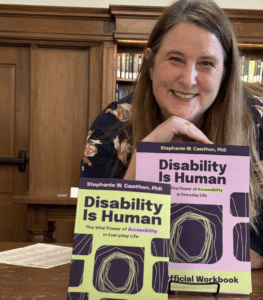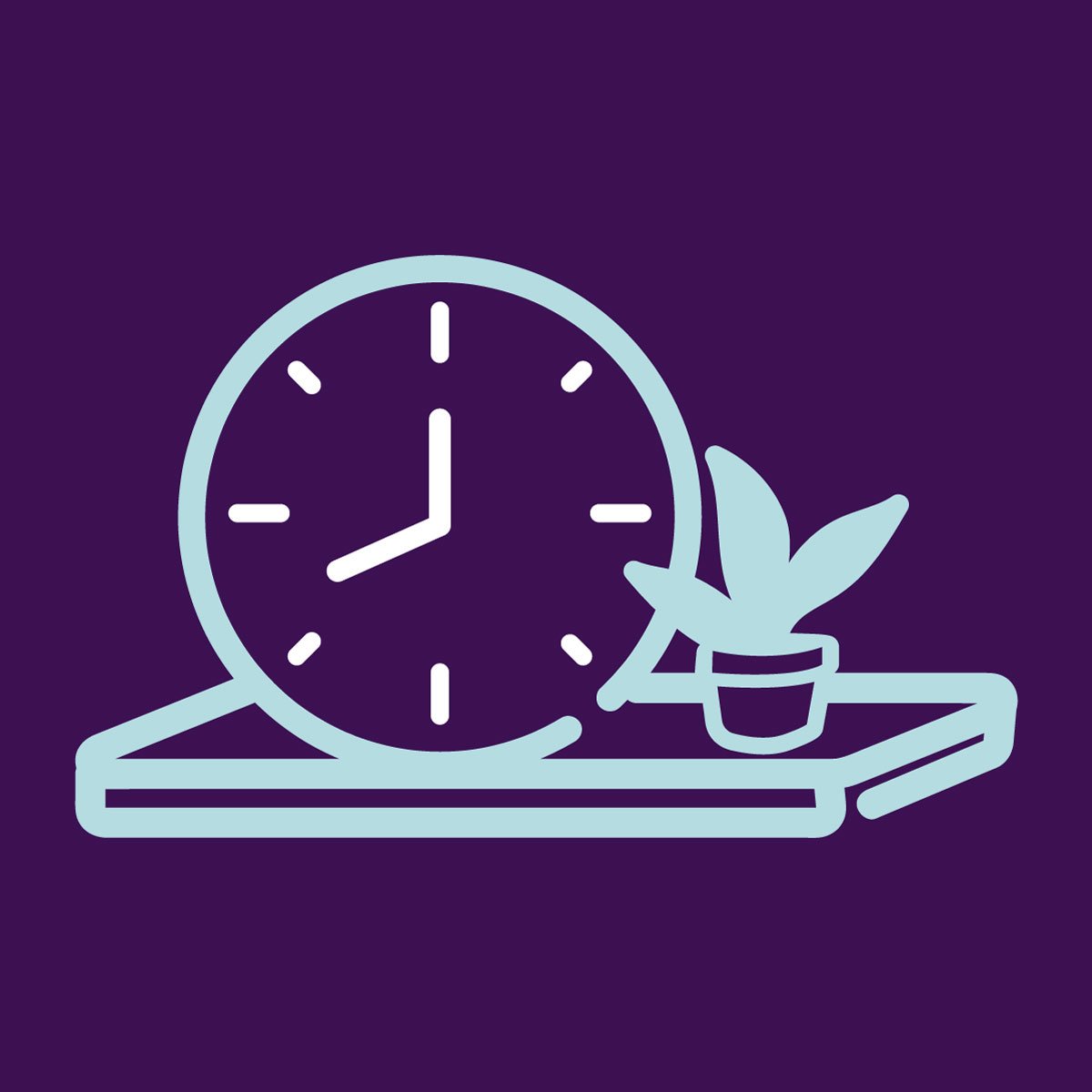Summary
The February issue of Stephanie's monthly newsletter!
👋 Welcome to the February issue of The Latest! Want to read Stephanie’s past issues? Check out the archive!
🌀 Lessons from Vertigo on Surviving the Spin
Keeping your eye on the target can be tough when everything’s spinning.
And yes, right now, our local, state, and national political contexts are churning.
Here’s some lessons I’ve learned from chronic vertigo about how to keep going:
-
Sometimes you have to lean INTO the spin to make it stop. Avoiding the spin can make you tail out even harder. Think about driving on ice. Same idea. It’ll straighten out eventually. Trust the lean and stay aware.
-
You can try to right the ship by yourself, but it is much less stressful and taxing with professional help. Even when I do have strategies to DIY my vertigo treatment, there are times when I choose to reduce my load and ask for assistance.
-
Back burner problems are seriously back burner problems. My vertigo is not high on my list of my chronic health conditions and disabilities. Months go by when my time and attention goes to more critical health items and not on the dizziness that creeps in each day. Letting go of that guilt over delayed action is self care.
A deep breath and a calm moment also does wonders. As does a decent night’s sleep. Panicking about all the spinning will not help anyone, least of all ourselves.
🎯 Let ME.
My word of the year is “accountability.”
Accountability for what I CAN do, and for what I need to do to best contribute my energy and gifts and to support community.
Accountability can help to find your place of strength and empowerment.
Enter Mel Robbins and her new book, The Let Them Theory.
Mel’s new book focuses on what we can bring to each challenge without also taking on the responsibilities that others must contribute.
Mel’s recent podcast interview with Martha Beck brought tears to my eyes and to my heart. I could physically feel the care and nurturing their insights gave me. While I may not be getting a Let Them tattoo any time soon, these conversations about our collective capacities and opportunities have left an indelible mark on my approach to accountability.
This form of accountability fits right in with what it means to stay focused on your own role and place of influence when our very livelihoods are being torn apart. Because we can all do something, no matter how small.
Here are some practical ways to do this:
-
Time blocking my to-do-list tasks into my calendar. I find it hugely satisfying to know that I have time dedicated to important items, so not everything is on that “pay attention to me” mental list. My worry-o-meter takes a pass.
-
Listening to people, but with a time limit. I am very aware that my energy threshold is limited. I give people fair notice when they are reaching that point where I need to kindly shift gears to silence. Healthy boundaries apply here.
-
Remembering who I advocate for and staying on message. It can be tempting to try to plug every hole and defend every purpose. We cannot be everything to everyone. That decision may disappoint some folks, but it’s a choice that allows me to actually be something to someone.
💭 Reflections from an Interactive Book Event
I just had my first live bookstore event at Book Woman in Austin, Texas. It was an intimate gathering with longtime advocates for disability. We each champion the rights of ALL to go to school, to work, and participate in our community.
We did a version of Disability IS… the first activity in the Disability Is Human Official Workbook. As always, this activity led to a fruitful conversation.
Some quotes from our discussion that continue to stay with me:
-
“It’s really hard to human these days.”
-
“After all these years, we finally meet in person (IRL for the win)!”
-
“Disability Is Human is for anyone who works with, leads, or mentors people.”
-
“My students want a book that gives us hope. Disability Is Human does this!”
I dearly appreciate the chance to connect with people and deepen our understanding of disability, ableism, and accessibility.
💬 If you are the friend of a bookstore, running a bookclub, or are hosting a conference, consider me as a keynote speaker, for a fireside chat, or for an author Q and A.
✨ The Story Behind the Cover Design for Disability Is Human
Writing a book isn’t just about words. It’s also about designing a publication that reflects your vision, appeals to readers, and elevates the project in ways you might not even see coming.
For Disability Is Human: The Vital Power of Accessibility in Everyday Life, Emily Egan was the ideal collaborator for graphic design and so much more.
The owner and creative visionary behind Emily Egan Design, Emily has been working with me since 2019 — building my brand identity and using colors, fonts, icons, and design excellence to boost every project from keynote speeches to classroom materials.
With creative simplicity and clear yet intuitive graphic design, Emily created all of the artwork and design elements for Disability Is Human.
Using high-contrast colors and intentional graphics, her hand-drawn icons and patterns are featured throughout in the book, workbook and in a cohesive merchandise collection that taps into the movement and viral message of the book’s title.
The cover design was a happy accident:
Cover design inspiration by Emily Egan
The front cover artwork Emily designed came from a little experiment she did during a brainstorming session in her home studio in Phoenix, Arizona.
“I scribbled randomly on the page, but in one continuous line. When I was done it looked like a big mess. To organize the mess, I started taking each point of the line and straightening it out, which turned into an imperfect spiral,” recalls Emily.
She put the imperfect spirals into ‘square-drops’ — squares with three rounded corners and one square corner — used in our projects several times over the years.
Emily explains the visual representation of the imperfect spirals is that the “work” of accessibility has no end or beginning. Building an accessible world requires us to reimagine more than just access. For many people, it can mean working in (or starting from) a raw place.
Ultimately, an imperfect spiral reminds us to use our core humanity as a guide.
🔍 Hot Off-The-Press Research!
My research team is working hard to bring projects from the messy middle to products ready for prime time. The National Disability Center for Student Success provides game-changing research that supports disabled students as they pursue degrees in higher education.
We finally released our first BIG data report:
Access Leads to Achievement: A National Report on Disabled College Student Experience.
It comes with a companion document:
The Campus Accessibility Measure: Toward Better Research and Understanding of the Disabled Student Experience in Postsecondary Education.
These milestone publications represent 18 months of dedicated work from the entire Center team – a true actualization moment of a vision set forth nearly two years ago.
Key findings from this report (see infographic on page 8!):
💡Disabled students are arriving on campus undiagnosed. Half of disabled college students in this study weren’t diagnosed with their disability until college.
💡Students may not tell you about their disability. Non-disclosure is pervasive among disabled college students, even with friends and roommates.
💡Disabled students experience many unintended challenges. Disabled students are less connected, struggle with daily barriers, and can feel isolated or misunderstood.
💡Disabled student success hangs in the balance. Lack of access and inclusion on campus and in classrooms led to academic delays, program transfer or withdrawals. These barriers impact self-worth and dreams for the future.
The opportunity to do this work with such a talented, diverse, and committed team is one of the most rewarding parts of my professional life. I am grateful to be a part of this effort and we look forward to continued collaborations.
Want to learn more about this groundbreaking work?
Registration for our FREE Townhall event is now open! This panel focuses on Digital Content Accessibility in Higher Education. Coming to you on Thursday, February 20th from 3-4pm CT on Zoom.
🌟 Disabled Creator Call Outs
Disabled Creator Call Outs continue to represent my commitment to sharing and promoting the work of disabled researchers from a broad range of perspectives and backgrounds. Our two spotlighted Creators this month:
I’ve only recently come to know his work on LinkedIn and am continually impressed by his authenticity and insights. Here is his bio – check out his feed!
Nathan is a neurodivergent individual diagnosed later in life with autism, ADHD, alexithymia, and complex PTSD. Like many others, he faced challenges growing up, unaware of these conditions or how to manage them. Unfortunately, he received little support from my family and was often underestimated. Despite these obstacles, he has built a successful career in cybersecurity. Today, he is a passionate advocate for neurodiversity in cybersecurity, committed to raising awareness and fostering inclusion for neurodivergent professionals in the industry.
I first met TJ as a member of a panel on representation of disabled scholars in disability research. He speaks with both authority and empathy in all he does. Here’s his bio with many ways to connect:
Timotheus “T.J.” Gordon Jr. is an autistic self-advocate, activist, social media enthusiast, and writer in the Chicagoland area, who focuses on autism acceptance in the African Diaspora, police violence towards people with disabilities, diverse learning, and disability culture. He is the creator of the Black Autist, a blog where he explores and promotes works related to autism and disability acceptance in the African Diaspora. As a poet also known as Pharaoh Inkabuss, Gordon uses his written and spoken poetry to discuss his multiple identities as a black, autistic man, along with his viewpoints on black culture, hip-hop, nerdom, and love.
🙏 And Finally…
My public life and my academic life rarely overlap. But last week the Provost’s office at UT Austin held an event for faculty authors, and Disability Is Human made an appearance!
To those of you wearing many hats, HATS OFF to you as well for keeping active across spaces that bring meaning to you.

Nothing like a library for a book event!
